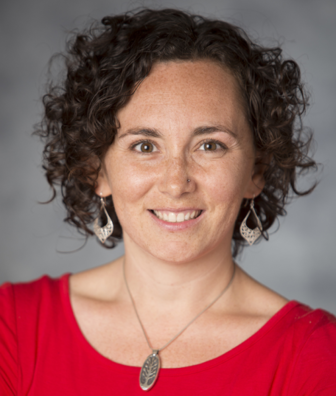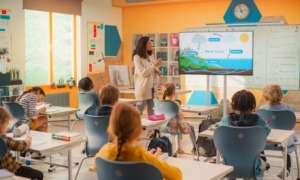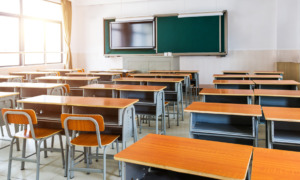 ANTON SOLOKOF/SHUTTERSTOCK
ANTON SOLOKOF/SHUTTERSTOCK
This time last year, I was in New Orleans for a child and youth well-being summit. Mardi Gras was over and leaders from across the country sat in a crowded room, without needing masks, discussing what today’s kids need to thrive. If only we could have known to prepare for a pandemic, or project the possibilities of what mass unemployment, racial violence and a political insurgency would mean for young people’s well-being and relationships in the months to come.
The country shut down days later. Already a remote worker, it was easy for me to work from home. My husband made a pop-up office in our bedroom, coordinating the Greater East St Louis COAD (Community Organizations Active in Disaster) with a view of our bed. My mom stopped working initially because it was too risky for her to continue substitute teaching and then because remote learning didn’t require substitute teachers at all. She moved in and helped me turn our house into a home `school.
We became my boys’ world. They missed friends but understood being apart. They missed family, but relatives were surviving their own versions of pandemic life and contact with them was sporadic at best. As the pandemic dragged on, staying connected got harder.

Stephanie Malia Krauss
We worry about the long-term consequences this past year will have on the boys’ social development. I worry even more about what it will mean for the other 74 million kids in our country, many of whom aren’t as well off.
Consider kids in rural communities who have been completely cut off, physically remote and lacking digital connectivity. Or kids who moved because parents couldn’t afford the mortgage or rent, now living in places with people they don’t know. Still others who spend their days alone, or taking care of siblings, because their parents can’t work remotely. Still more — too many — are trapped in unstable or dangerous living situations, without school or out-of-school time activities to offer reprieve.
In every situation, there are three relationships kids need most, in pandemic life and after it, whether life is hard or relatively easy. They have a base in social health and social capital research, rooted in child development, sociology and psychology.
- Lifelines: It is well established that every child needs one caring adult. Life is much better, however, when there’s more than one. Positive and healthy friendships and family supports are especially important during tough times. Instability surrounds us; kids are better off when they can count on a strong, stable social web of support. Check in with young people and ask how things are going with friends and family. If you are a lifeline relationship to a young person, reach out often and consistently show care.
- Navigators: All of us benefit from people who have made it through whatever we are going through. Surviving a pandemic is new, but many issues that come with it are not. As kids take on the realities of this time, connect them to people who get it. As they return to school, choose a college — or choose not to go to college — surround them with near-peers who have faced similar circumstances. I recommend near-peer navigators because everything is changing so fast. The people in the best position to provide navigational support are those close in age and life stage.
- Door openers: The pandemic deepened disparities and illuminated the crushing difference between what’s available to wealthy families compared to those without. Millions of young people missed out on a year of extracurriculars and enrichment activities, everything from college access programming to sports, the arts and volunteer opportunities. For many kids, these are key to securing future scholarships and jobs. We must find creative and safe ways to continue providing and even bolstering these “extra” offerings, because they are actually essential.
In youth development, we work with all types of kids and families. Each has their own pandemic story of social loss to tell and recover from. As we gear up for the road ahead, let’s prioritize and nurture the relationships and connections kids need most. Doing so will help them to endure the pandemic, recover from it and ultimately thrive and experience well-being in the years ahead.
Stephanie Malia Krauss, an educator, social worker, researcher and writer, is a senior advisor to JFF and a staff consultant for the Youth Transition Funders Group. Her debut book is “Making It: What Today’s Kids Need for Tomorrow’s World.”































